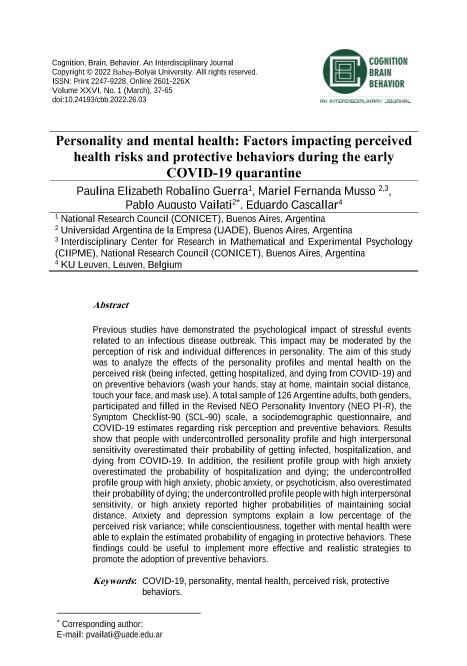Mostrar el registro sencillo del ítem
dc.contributor.author
Musso, Mariel Fernanda

dc.contributor.author
Cómbita, Lina M.
dc.contributor.author
Cascallar, Eduardo C.
dc.contributor.author
Rueda, M. Rosario
dc.date.available
2024-04-05T19:51:16Z
dc.date.issued
2022-03
dc.identifier.citation
Musso, Mariel Fernanda; Cómbita, Lina M.; Cascallar, Eduardo C.; Rueda, M. Rosario; Modeling the Contribution of Genetic Variation to Cognitive Gains Following Training with a Machine Learning Approach; John Wiley & Sons; Mind, Brain, and Education; 16; 4; 3-2022; 300-317
dc.identifier.uri
http://hdl.handle.net/11336/232216
dc.description.abstract
Previous studies have demonstrated the psychological impact of stressful events related to an infectious disease outbreak. This impact may be moderated by the perception of risk and individual differences in personality. The aim of this study was to analyze the effects of the personality profiles and mental health on the perceived risk (being infected, getting hospitalized, and dying from COVID-19) and on preventive behaviors (wash your hands, stay at home, maintain social distance, touch your face, and mask use). A total sample of 126 Argentine adults, both genders, participated and filled in the Revised NEO Personality Inventory (NEO PI-R), the Symptom Checklist-90 (SCL-90) scale, a sociodemographic questionnaire, and COVID-19 estimates regarding risk perception and preventive behaviors. Results show that people with undercontrolled personality profile and high interpersonal sensitivity overestimated their probability of getting infected, hospitalization, and dying from COVID-19. In addition, the resilient profile group with high anxiety overestimated the probability of hospitalization and dying; the undercontrolled profile group with high anxiety, phobic anxiety, or psychoticism, also overestimated their probability of dying; the undercontrolled profile people with high interpersonal sensitivity, or high anxiety reported higher probabilities of maintaining social distance. Anxiety and depression symptoms explain a low percentage of the perceived risk variance; while conscientiousness, together with mental health were able to explain the estimated probability of engaging in protective behaviors. These findings could be useful to implement more effective and realistic strategies to promote the adoption of preventive behaviors.
dc.format
application/pdf
dc.language.iso
eng
dc.publisher
John Wiley & Sons

dc.rights
info:eu-repo/semantics/openAccess
dc.rights.uri
https://creativecommons.org/licenses/by-nc-nd/2.5/ar/
dc.subject
COGNITIVE GAINS
dc.subject
MACHINE LEARNING
dc.subject
GENETIC VARIATION
dc.subject
PREDICTION
dc.subject.classification
Psicología

dc.subject.classification
Psicología

dc.subject.classification
CIENCIAS SOCIALES

dc.title
Modeling the Contribution of Genetic Variation to Cognitive Gains Following Training with a Machine Learning Approach
dc.type
info:eu-repo/semantics/article
dc.type
info:ar-repo/semantics/artículo
dc.type
info:eu-repo/semantics/publishedVersion
dc.date.updated
2024-04-03T13:37:27Z
dc.identifier.eissn
1751-228X
dc.journal.volume
16
dc.journal.number
4
dc.journal.pagination
300-317
dc.journal.pais
Estados Unidos

dc.journal.ciudad
Nueva Jersey
dc.description.fil
Fil: Musso, Mariel Fernanda. Consejo Nacional de Investigaciones Científicas y Técnicas. Oficina de Coordinación Administrativa Saavedra 15. Centro Interdisciplinario de Investigaciones en Psicología Matemática y Experimental Dr. Horacio J. A. Rimoldi; Argentina. Universidad de Granada. Centro de Investigación Mente, Cerebro y Comportamiento; España. Universidad Argentina de la Empresa; Argentina
dc.description.fil
Fil: Cómbita, Lina M.. Universidad de Granada. Centro de Investigación Mente, Cerebro y Comportamiento.; España
dc.description.fil
Fil: Cascallar, Eduardo C.. Katholikie Universiteit Leuven; Bélgica
dc.description.fil
Fil: Rueda, M. Rosario. Universidad de Granada. Centro de Investigación Mente, Cerebro y Comportamiento.; España
dc.journal.title
Mind, Brain, and Education
dc.relation.alternativeid
info:eu-repo/semantics/altIdentifier/doi/http://dx.doi.org/10.1111/mbe.12336
dc.relation.alternativeid
info:eu-repo/semantics/altIdentifier/url/https://onlinelibrary.wiley.com/doi/10.1111/mbe.12336
Archivos asociados
